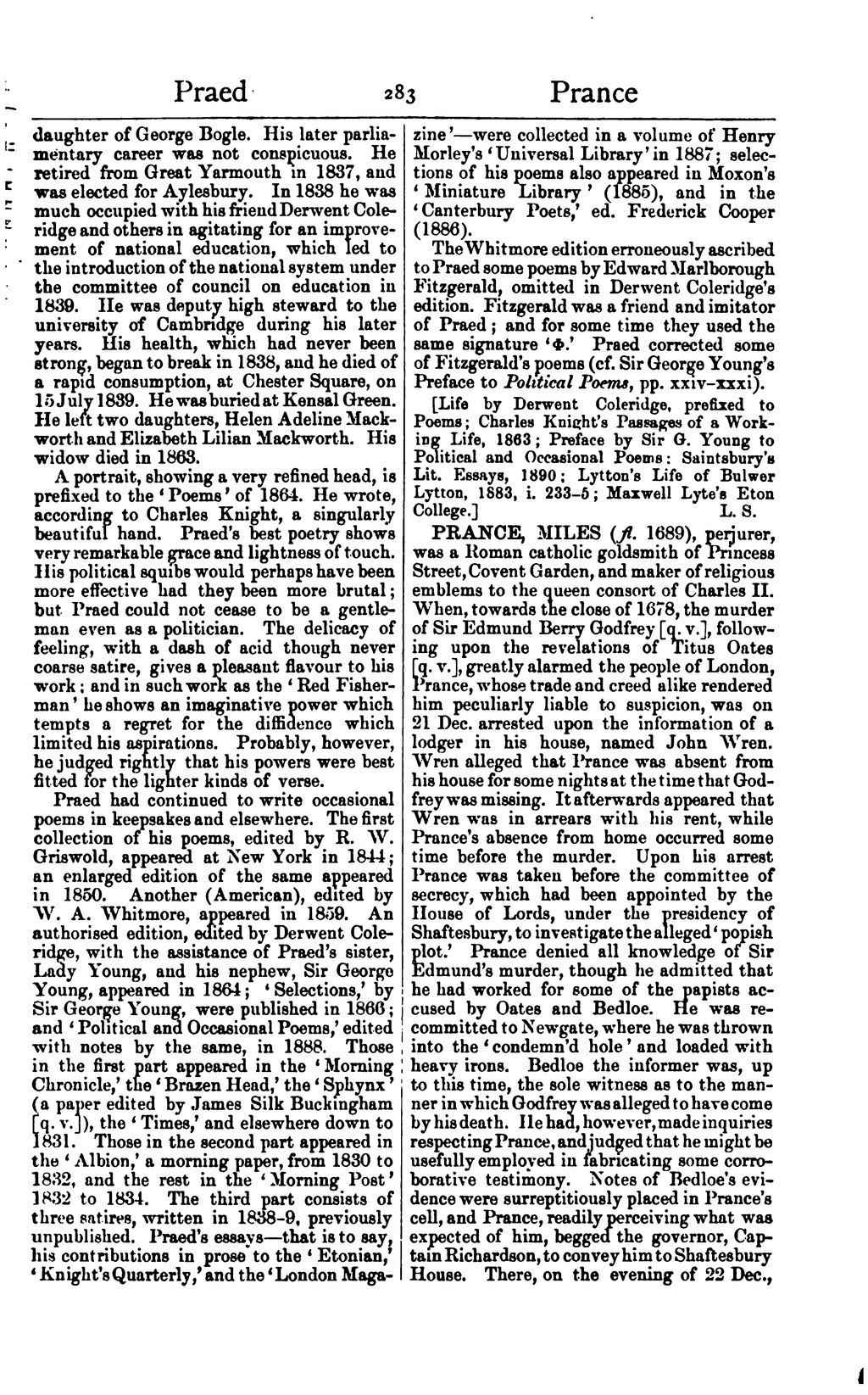daughter of George Bogle. His later parliamentary career was not conspicuous. He retired from Great Yarmouth in 1837, and was elected for Aylesbury. In 1838 he was much occupied with his friend Derwent Coleridge and others in agitating for an improvement of national education, which led to the introduction of the national system under the committee of council on education in 1839. He was deputy high steward to the university of Cambridge during his later years. His health, which had never been strong, began to break in 1838, and he died of a rapid consumption, at Chester Square, on 15 July 1839. He was buried at Kensal Green. He left two daughters, Helen Adeline Mackworth and Elizabeth Lilian Mackworth. His widow died in 1863.
A portrait, showing a very refined head, is prefixed to the ‘Poems’ of 1864. He wrote, according to Charles Knight, a singularly beautiful hand. Praed's best poetry shows very remarkable grace and lightness of touch. His political squibs would perhaps have been more effective had they been more brutal; but Praed could not cease to be a gentleman even as a politician. The delicacy of feeling, with a dash of acid though never coarse satire, gives a pleasant flavour to his work; and in such work as the ‘Red Fisherman’ he shows an imaginative power which tempts a regret for the diffidence which limited his aspirations. Probably, however, he judged rightly that his powers were best fitted for the lighter kinds of verse.
Praed had continued to write occasional poems in keepsakes and elsewhere. The first collection of his poems, edited by R. W. Griswold, appeared at New York in 1844; an enlarged edition of the same appeared in 1850. Another (American), edited by W. A. Whitmore, appeared in 1859. An authorised edition, edited by Derwent Coleridge, with the assistance of Praed's sister, Lady Young, and his nephew, Sir George Young, appeared in 1864; ‘Selections,’ by Sir George Young, were published in 1866; and ‘Political and Occasional Poems,’ edited with notes by the same, in 1888. Those in the first part appeared in the ‘Morning Chronicle,’ the ‘Brazen Head,’ the ‘Sphynx’ (a paper edited by James Silk Buckingham [q. v.]), the ‘Times,’ and elsewhere down to 1831. Those in the second part appeared in the ‘Albion,’ a morning paper, from 1830 to 1832, and the rest in the ‘Morning Post’ 1832 to 1834. The third part consists of three satires, written in 1838–9, previously unpublished. Praed's essays—that is to say, his contributions in prose to the ‘Etonian,’ ‘Knight's Quarterly,’ and the ‘London Magazine’—were collected in a volume of Henry Morley's ‘Universal Library’ in 1887; selections of his poems also appeared in Moxon's ‘Miniature Library’ (1885), and in the ‘Canterbury Poets,’ ed. Frederick Cooper (1886).
The Whitmore edition erroneously ascribed to Praed some poems by Edward Marlborough Fitzgerald, omitted in Derwent Coleridge's edition. Fitzgerald was a friend and imitator of Praed; and for some time they used the same signature ‘Φ.’ Praed corrected some of Fitzgerald's poems (cf. Sir George Young's Preface to Political Poems, pp. xxiv–xxxi).
[Life by Derwent Coleridge, prefixed to Poems; Charles Knight's Passages of a Working Life, 1863; Preface by Sir G. Young to Political and Occasional Poems; Saintsbury's Lit. Essays, 1890; Lytton's Life of Bulwer Lytton, 1883, i. 233–5; Maxwell Lyte's Eton College.]
PRANCE, MILES (fl. 1689), perjurer, was a Roman catholic goldsmith of Princess Street, Covent Garden, and maker of religious emblems to the queen consort of Charles II. When, towards the close of 1678, the murder of Sir Edmund Berry Godfrey [q. v.], following upon the revelations of Titus Oates [q. v.], greatly alarmed the people of London, Prance, whose trade and creed alike rendered him peculiarly liable to suspicion, was on 21 Dec. arrested upon the information of a lodger in his house, named John Wren. Wren alleged that Prance was absent from his house for some nights at the time that Godfrey was missing. It afterwards appeared that Wren was in arrears with his rent, while Prance's absence from home occurred some time before the murder. Upon his arrest Prance was taken before the committee of secrecy, which had been appointed by the House of Lords, under the presidency of Shaftesbury, to investigate the alleged ‘popish plot.’ Prance denied all knowledge of Sir Edmund's murder, though he admitted that he had worked for some of the papists accused by Oates and Bedloe. He was recommitted to Newgate, where he was thrown into the ‘condemn'd hole’ and loaded with heavy irons. Bedloe the informer was, up to this time, the sole witness as to the manner in which Godfrey was alleged to have come by his death. He had, however, made inquiries respecting Prance, and judged that he might be usefully employed in fabricating some corroborative testimony. Notes of Bedloe's evidence were surreptitiously placed in Prance's cell, and Prance, readily perceiving what was expected of him, begged the governor, Captain Richardson, to convey him to Shaftesbury House. There, on the evening of 22 Dec.,
